tl;dr
To keep Map< Integer , String > in an order sorted by key, use either of the two classes implementing the SortedMap/NavigableMap interfaces:
… or third-party implementations. Perhaps in Google Guava or Eclipse Collections (I’ve not checked).
If manipulating the map within a single thread, use the first, TreeMap. If manipulating across threads, use the second, ConcurrentSkipListMap.
For details, see the table below and the following discussion.
Details
Here is a graphic table I made showing the features of the ten Map implementations bundled with Java 11.
The NavigableMap interface is the successor to SortedMap. The SortedMap logically should be removed but cannot be as some 3rd-party map implementations may be using interface.
As you can see in this table, only two classes implement the SortedMap/NavigableMap interfaces:
Both of these keep keys in sorted order, either by their natural order (using compareTo method of the Comparable(https://docs.oracle.com/en/java/javase/11/docs/api/java.base/java/lang/Comparable.html) interface) or by a Comparator implementation you pass. The difference between these two classes is that the second one, ConcurrentSkipListMap, is thread-safe, highly concurrent.
See also the Iteration order column in the table below.
- The
LinkedHashMap class returns its entries by the order in which they were originally inserted.
EnumMap returns entries in the order by which the enum class of the key is defined. For example, a map of which employee is covering which day of the week (Map< DayOfWeek , Person >) uses the DayOfWeek enum class built into Java. That enum is defined with Monday first and Sunday last. So entries in an iterator will appear in that order.
The other six implementations make no promise about the order in which they report their entries.

